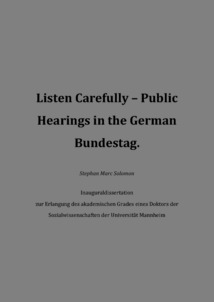|
Listen carefully - public hearings in the German Bundestag
Solomon, Stephan Marc
![[img]](https://madoc.bib.uni-mannheim.de/style/images/fileicons/application_pdf.png)  Vorschau |
|
PDF
Solomon_Dissertation_2015.pdf
- Veröffentlichte Version
Download (2MB)
|
|
URL:
|
https://madoc.bib.uni-mannheim.de/39944
|
|
URN:
|
urn:nbn:de:bsz:180-madoc-399446
|
|
Dokumenttyp:
|
Dissertation
|
|
Erscheinungsjahr:
|
2015
|
|
Ort der Veröffentlichung:
|
Mannheim
|
|
Hochschule:
|
Universität Mannheim
|
|
Gutachter:
|
König, Thomas
|
|
Datum der mündl. Prüfung:
|
2 Dezember 2015
|
|
Sprache der Veröffentlichung:
|
Englisch
|
|
Einrichtung:
|
Fakultät für Sozialwissenschaften > Politikwissenschaft, Europäische Politik (König 2007-)
|
|
Fachgebiet:
|
310 Statistik
320 Politik
|
|
Fachklassifikation:
|
THES_SOZ:
Hearing,
Bundestag,
Koalition,
parlamentarischer Ausschuss,
Öffentlichkeit,
|
|
Normierte Schlagwörter (SWD):
|
Anhörung , Ausschuss , Deutschland , Bundestag , Parlament , Öffentlichkeit , Gesetzgebung
|
|
Freie Schlagwörter (Deutsch):
|
Anhörung , Bundestag , Öffentliche Anhörung, Parlament , Koalitionskonflikt
|
|
Freie Schlagwörter (Englisch):
|
Hearing , Public Hearing , Bundestag , Parliament , Scrutiny , Coalition , Conflict
|
|
Abstract:
|
This dissertation thesis is about how elected officials in a parliamentary democracy utilize public hearings to further political goals. Public hearings serve as a mechanism within parliamentary committees of the German Bundestag to monitor and scrutinize ministerial bill proposals. As the opposition can only monitor the content of a bill and try to delay its adoption, it is up to the coalition majority in a committee to actually change its content through scrutiny. Expertise is deliberately used, it is not primarily for the sake of information gathering or “enlightened” decision making. While the three predominant schools of thought on the U.S.Congress (informational, distributional, partisan) stress different modes of political incentives in committees to address different audiences, I argue that public hearings can serve as a basis for principal-agent control by signaling unfaithfulness or incompetence of a coalition partner.
The approach I take in this study builds on transaction cost theory, especially its sub-branch of principal-agent-models. Transaction costs occur because of ending information capacities of political actors, institutional and legal constraints, and policy conflict. Through public hearings, political parties economize on transaction costs of various kinds. Rooted in transaction cost theory, I propose facilitating the framework of “audience cost theory” taken from the International Relations literature on interstate conflicts to explain why public hearings are public. In particular, I propose that Public hearings can serve as a punishment mechanism in a principal-agent-relationship between a cabinet and a minister by imposing a specific kind of transaction cost, the loss of public support for backing down from a coalition compromise and thus being perceived as incompetent or unfaithful. Since this publicity on a coalitional conflict can be detrimental to all coalition partners, the instrument of public hearings will only be used in the presence of very large conflict. Thus, I adopt an outlook that centers on the strategic costs and benefits of public hearings in the parliamentary arena.
In chapter two I review the development of public hearings in the German Bundestag, especially the reform of standing procedures which turned public hearings into a strategic instrument. I lay out the foundations of transaction cost theory. Public hearings are one possible solution to economize on transaction costs in a political market. In chapter three I show why public hearings are used in the first place by relating general governance structures within parliamentary democracies to public hearings. Extending data from previous research on parliamentary governance (Martin and Vanberg 2004, 2005) I find strong empirical support that public hearings are systematically related to both the complexity of a proposal and partisan conflicts in the German Bundestag. In the presence of coalitional conflict, public hearings are less likely, especially if the proposal has financial implications. Conflicts between government and opposition make public hearings more likely. To explain what public hearings are good for, a specific focus will be put on the recent coalition governance model and empirical results by Martin and Vanberg (2011) in chapter four. In public hearings, government partners scrutinize each other only if alternative monitoring and control mechanisms have not resolved the conflict. Consequently, the existence of junior ministers to mirror ministerial behavior reduces the likelihood of a public hearing to occur. In the event that an intracoalitional conflict is debated in a public hearing this substantially increases the number of amendments to a proposal. The opposition employs public hearings to delay policy proposals that are relatively more important but uncontroversial. As the empirical results suggest, contrary to previous research (Martin and Vanberg 2004) intra-coalitional conflict on important issues does not seem to increase legislative delay. Instead, public hearings on proposals important to the opposition significantly delay lawmaking. Finally, I borrow audience cost theory (ACT) from the International Relations literature on interstate conflicts and apply it to public hearings to explain the reasons for a hearing being public in chapter five. Against theoretical expectations, minsters do not “tie their hands” to a bill to credibly commit to implementing proposals important to their electorate. Instead, public hearings create audience costs by increasing the number of newspaper articles on policy proposals that divide government partners. The concluding chapter closes with broader normative implications of the findings.
|
 | Dieser Eintrag ist Teil der Universitätsbibliographie. |
 | Das Dokument wird vom Publikationsserver der Universitätsbibliothek Mannheim bereitgestellt. |
 Suche Autoren in Suche Autoren in
Sie haben einen Fehler gefunden? Teilen Sie uns Ihren Korrekturwunsch bitte hier mit: E-Mail
Actions (login required)
 |
Eintrag anzeigen |
|
